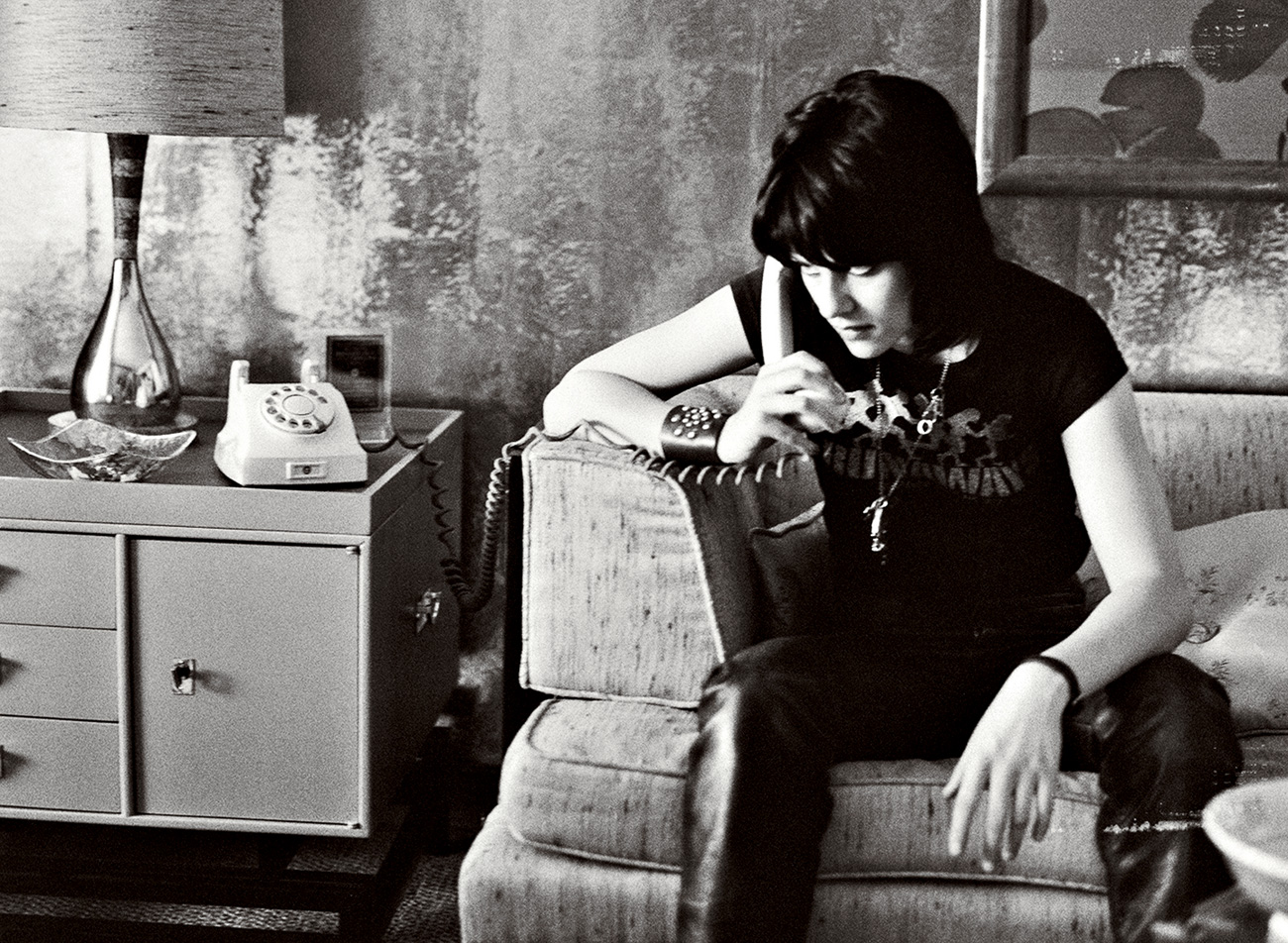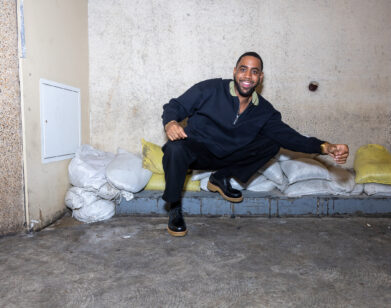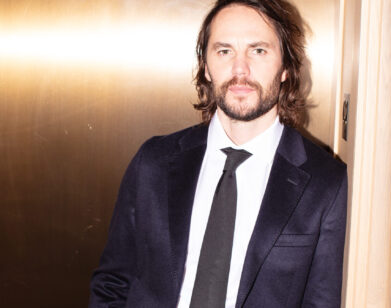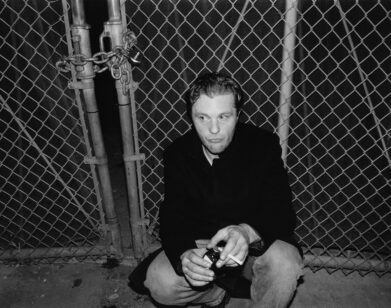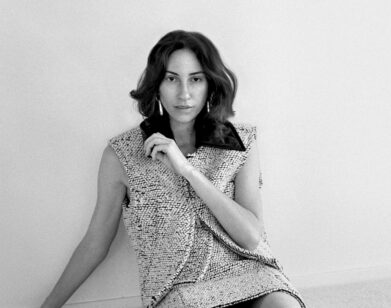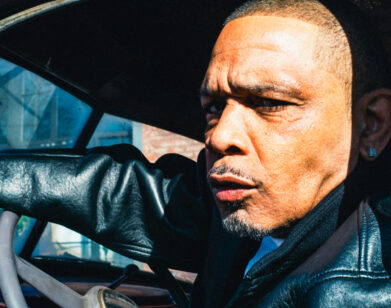Joan Jett
In the four years that they were together, the quintet of teenage girls that made up The Runaways cut a swath of hard rock, harder kisses, and, eventually, scary-hard drugs through the legendary glam scene of 1970s Los Angeles. Their exploits-and exploitation-are the stuff of legend and now of The Runaways, the debut feature film from photographer and video director Floria Sigismondi. Based on trouble-doll lead singer Cherie Currie’s 1989 autobiography, Neon Angel, Sigismondi hones in on the relationship between Currie and the band’s co-founder, songwriter, and guitarist Joan Jett (Currie’s book, written with Tony O’Neill, is being published in an updated version this month by HarperCollins). Dakota Fanning plays the beautiful, damaged Currie; Michael Shannon steals the show as the evil genius svengali Kim Fowley; and Kristen Stewart plays Jett, all black-leather attitude and sex appeal-Elvis plus estrogen.
In part because of rights issues, The Runaways pays short shrift to the band’s other members-guitarist Lita Ford, bassist Jackie Fox, and drummer Sandy West. But driven by great songs, the film-and the feeling of liberation, love, and pain teenagers find in music and each other-is dead on. “I was looking for raw,” says Sigismondi, who has directed videos for the likes of Marilyn Manson, The White Stripes, David Bowie, Björk, The Cure, and Interpol. “This very short period of time held a big place in all of their lives. It was a very delicate thing, but it wasn’t all heartfelt. There was anger. There was resentment. There was sorrow. They were breaking new ground. They were taking risks. They were doing things that brought them up against walls.” I recently spoke to Jett-creator of some of the greatest-of-all-time anthems like “Bad Reputation” and “I Love Rock ‘n’ Roll” and who, with her manager, Kenny Laguna, executive-produced The Runaways-about what it was like to see her youthful triumphs and excesses (including some steamy scenes with Currie) on screen. “Joan Jett-she’s just one of a kind, and has never veered from her path,” Sigismondi says. “She’s gone out there and said, ‘This is who I am.’ And she’s still doing that.”
EVELYN MCDONNELL: How is it for you to watch The Runaways?
JOAN JETT: It’s pretty surreal. It’s hard to judge, hard to have some distance from, but I’m working on it and it’s getting better. It’s not painful for me to watch, so I think that’s a good sign. The only part that’s painful is that I go, “Oh, man, I’d like to do it again and really pay attention.” Not that I wasn’t paying attention back then, but you don’t realize sometimes when you’re in moments how special they are until they’re gone.
MCDONNELL: Is this something that you’ve wanted for a while-for The Runaways’ story to be told?
Anyone who wants to know who I am can just read my lyrics-I’ve always written about who I am.JoanJett
JETT: Well, not me so much-I think that’s true more so for the other girls. I was always pretty resistant to both a Runaways reunion or just any sort of movie situation. I guess I was afraid that the only thing that could happen is that things could go wrong. Maybe it was a way to protect it for myself because The Runaways was so special to me and meant so much, beyond just girls playing rock ‘n’ roll. I think it represented a lot to me about following your dreams, about not being dictated to about what your life is going to be. Girls see these defined roles they’re supposed to follow in life, but when I was a young child, my parents told me I could be anything. Before I settled on music, I wanted to be an archaeologist, an astronaut, all sorts of really diverse things.
MCDONNELL: There’s a scene in the film where you’re playing guitar, and the teacher tells you that girls can’t play rock ‘n’ roll. Did that actually happen?
JETT: That scene in the movie is basically true. I walked in and said, “Teach me how to play rock ‘n’ roll.” And the guy brought out sheet music and tried to teach me “On Top of Old Smoky.” That was the last lesson I ever took. Being told that girls can’t play rock ‘n’ roll-I mean, even as a kid, it was so illogical to me-it’s like, what do you mean? That girls can’t master the instruments? I’m in school with girls playing cello and violin and Beethoven and Bach. You don’t mean they can’t master the instrument. What you mean is they’re not allowed, socially-it’s a societal thing. You’re not allowed to play rock ‘n’ roll because rock ‘n’ roll means you’re covering Sticky Fingers. Rock ‘n’ roll means “Whole Lotta Love.” You go listen to these songs and albums again and realize how dirty they sound, how much sex is dripping from them. And that kind of stuff is very threatening. It seems like really displaced energy to me for so many people to have been so up in arms about The Runaways playing rock ‘n’ roll. So we were a little outrageous, and part of it was to stir people up. Then again, we didn’t want to get any more banned than The Rolling Stones. We wanted to have the same radio access and the same magazine access and all that kind of stuff.
MCDONNELL: How did you finally decide that this movie was going to be an okay situation to talk about the past again?
JETT: I felt confident with the level of success-the people at River Road, the Linsons [producers of the film]. Then they hired Floria to write the screenplay and direct, and I knew that I was in good hands.
MCDONNELL: One of the really interesting things about the movie is how well it captures 1970s Los Angeles and the sort of freedom and excess and hedonism and danger of it all.
JETT: Yeah, I think it does, actually-that music, that sort of combination of glam and intensity. It was decadent. It was also very attractive.
MCDONNELL: How was it working with Kristen Stewart, who plays you in the film? What did you tell her? How did she study you?
JETT: Well, I found Kristen to be through and through totally professional and just great to be around. I found us to be really, scarily similar, just in our physicality, the way we move through space. The first time we met was a little over a year ago, New Year’s Eve. She came to see us do a concert. We hung out for the whole day, and I just dumped on her about everything I could think about The Runaways-I mean, the good, the bad, and the ugly. I told her all that stuff and how much it meant to me. Then she went off to do New Moon, and I didn’t see her again until about two weeks before The Runaways thing started. But she is so authentic. The thing that came through to me was that it was important to her to capture it. She really wanted to nail it. So I gave her all The Runaways music that I could find; I gave her tapes of me talking. . . . When we were together prior to the start of filming, she was staring at me the whole time. And I was fine with it because I knew she was watching my posture, my mannerisms, everything I did, the way I hold my hands, just everything. And she really soaked it in. When we were hanging out together on set, it was like I had a mirror image. Even just sitting around, we’d do the same thing at the same time. It was just great-and it wasn’t creepy. It was wonderfully special.
MCDONNELL: It really becomes a movie about you and Cherie.
JETT: That’s really what it is. I think, initially it was mischaracterized, because at first it was called a “biopic,” which implies that it’s going to be a literal reading of the action. But to me, it’s more of a parallel narrative of The Runaways. It’s based on Cherie’s book, so it definitely comes from her perspective and focuses more on probably the two of us and Kim.
MCDONNELL: I think some of the stuff that the movie depicts is timeless, like if you’re a young woman in the public eye like that, how do you display your sexuality? Is it in a way that’s going to be powerful? Or in a way that’s going to be used against you?
JETT: Those are absolutely still issues. It’s funny how little has changed since The Runaways formed. I think, if anything, maybe the movie can restart the conversation about that, too. Not just in music, not just about rock ‘n’ roll and girls in rock ‘n’ roll, but across the board about how women are looked at and how, if they try to be sexual or use their sexuality in a powerful way, they’re judged much differently than men.
MCDONNELL: There’s a fair amount of sex in this movie. Are you comfortable with how that is presented?
JETT: Yeah, I’m comfortable with it. Look, all kids experiment-all kids have those feelings. And so I think it’s kind of ridiculous not to give any sort of attention to it.
MCDONNELL: Are you comfortable if people say, “Oh, she was a lesbian,” or “Oh, she’s bisexual,” or whatever? When they see this movie, people are probably going to say that.
JETT: I guess they’ve always said those kinds of things to a degree anyway. Anyone who wants to know who I am can just read my lyrics-I’ve always written about who I am. Look, in The Runaways I learned at a very young age, because I could see the looks in the writers’ eyes when they would ask me questions about the band and our offstage antics, and I could see from the way they asked the questions that if I answered this stuff, that was all they were ever going to write about. It was one of those gut-instinct things that doesn’t have to be taught. If you want to go there, yeah, then that’s what they’re going to focus on. But that’s not what I want people to focus on-I want people to focus on the music. And if they want to know who I am, I write about who I am in the lyrics, so don’t be lazy-read the lyrics and figure it out for yourself. I sing to everyone, that’s the bottom line. You don’t want to say, “All right, you guys, you can’t be involved in this.” You want everybody to be involved. You want everybody to want you.
MCDONNELL: I was hoping that Cherie was going to perform with you at your Blackhearts gig at Sundance. Would that ever happen?
JETT: Oh, yeah, definitely, I would love for that to happen. We’ve had Cherie on to sing “Cherry Bomb” a couple times. Just for fun, you know. It’s great to be onstage together again. When we were laying down some reference vocals for Dakota and Kristen before they started to record, Cherie and I hadn’t been in the studio with each other in . . . a long time. [laughs] I don’t have to put a number on it, but you guys can guess. I swear to god, we walked in-no rehearsal, track rolls, we do the backgrounds, we sing whatever song it was-and we did it just exactly like The Runaways, like it was last week. It was one of those kinds of moments you live for-and I was paying attention to it this time.
MCDONNELL: Well, as you said earlier, you just wish you could do it again. Could that ever happen?
JETT: No, you can’t go back.
MCDONNELL: What about your own music?
JETT: We’re doing a greatest hits. I guess it’s a CD now-or no, a file. [both laugh] Working on my new file. [Jett’s label, Blackheart Records, is releasing a double-album greatest hits collection, Joan Jett and the Blackhearts, this month.] I added a couple Runaways ones in there because I consider that to be part of my life and some of my best songs as well, so I’m looking forward to that.
MCDONNELL: There’s a line in the movie that says that if you weren’t doing this, you’d be in jail or dead. Do you think that’s true about you? Or would you have become an archaeologist or an astronaut?
JETT: Well, after The Runaways broke up, if I had lived through the period of mourning afterwards and not run into Kenny Laguna, then, yeah, maybe I would have become an archaeologist or something else. I’d like to think that I wouldn’t have just spiraled down, that I would have applied myself in some other direction. But, I was very devastated, obviously, when The Runaways broke up.
MCDONNELL: Well, one of the things that the movie conveys about you is that you are really the hardest-working woman in rock ‘n’ roll. You just have this commitment to it.
JETT: Well, yeah! It’s not bullshit. It’s not a rap. I was saying this long ago in The Runaways, and I was saying it when I had the big hit: It’s real-I really enjoy this. It’s beyond just the music. It’s about performing live, having that connection with the audience, looking in people’s eyes and seeing them smile and knowing that maybe they’re going to remember that for the rest of their life, that little moment they had with me, just like I might remember a little moment I had, stealing David Johansen’s beer bottle off the stage when I was 14.

